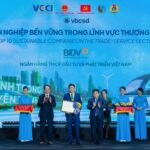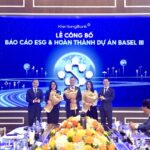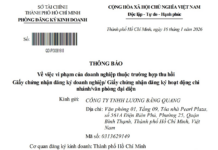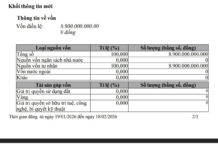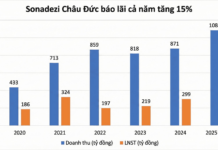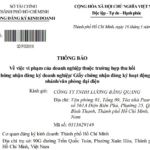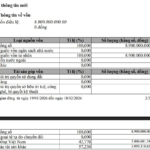At the 7th Annual Forum on “Investing in Corporate Governance: Strategies for Attracting Responsible Investors in the Context of International Market Integration” organized by the Vietnam Institute of Directors (VIOD) with the support of the International Finance Corporation (IFC), the Swiss State Secretariat for Economic Affairs (SECO), and the State Securities Commission, experts asserted: “The need to enhance the quality and level of corporate governance in Vietnam should be truly regarded as an important strategic objective and given top priority.”
According to VIOD’s report, investors, especially international investment funds, are currently focusing their sustainable investment efforts on businesses that implement corporate governance linked to measuring environmental and social impact.
CRUCIAL FACTORS FOR ATTRACTING RESPONSIBLE INVESTORS
Ms. Kasturi Nathan, Senior Expert in Strategy, Risk Management, and Transactions at Deloitte Southeast Asia, assessed that amid geopolitical tensions, economic uncertainties, and shifting market dynamics, corporate governance is a critical factor in attracting international investment in today’s interconnected and volatile environment.
“In a world where investors’ trust lies in reliability and accountability, robust governance frameworks can be seen as a signal of credibility – an essential factor in creating long-term value,” emphasized Ms. Kasturi Nathan.

On the other hand, Mr. Vu Quang Thinh, Director of Dynam Capital Fund Management Company, shared that over the past 20 years, global investors have talked extensively about governance rather than focusing solely on profits. Whereas previously, businesses and investors were solely concerned with financial matters and profits, they are now paying more attention to responsible investing.
“The world has also witnessed a significant increase in responsible investor groups. According to a study, the responsible business market size stands at $158 trillion, which is substantial compared to GDP. As investors’ most significant fear is losing money, improving corporate governance within businesses has become a priority,” said Mr. Thinh.
However, according to VIOD, the overall level of corporate governance and ESG-linked corporate governance in Vietnam is currently at the lowest level among the six ASEAN countries and below the average assessment of the ASEAN Corporate Governance Scorecard (ACGS).
Mr. Trinh Hoai Giang, CEO of HSC Securities Joint Stock Company, also shared that investors today are more concerned about non-financial aspects, specifically corporate governance, rather than financial matters.
To achieve a successful and high-value transaction, only companies with good governance can attain this. Therefore, the HSC CEO advised businesses to adopt a holistic perspective, considering not only profits and shareholder interests but also environmental and social impacts.
“If a business were likened to a student, that student must be both smart and well-behaved. Smart implies growth and development, while well-behaved implies sustainability,” Mr. Giang analogized.
DIVERSITY IN GOVERNANCE STRATEGIES
Data from McKinsey and the World Bank indicate that companies with good governance quality are valued 10-20% higher and have 10-15% lower capital costs when raising capital.
As one of the leading agricultural conglomerates in Vietnam, PAN Group’s CEO, Nguyen Thi Tra My, shared that to fulfill its mission, the company’s sustainable development is one of PAN’s foremost concerns. The group currently employs 11,000 people across more than 10 member companies, most of which are listed, with a total of 68 board members.
Among them, the parent company’s board comprises seven members. According to Ms. My, the most distinctive feature is diversity. PAN’s board composition has always been diverse in terms of fields, experience, age groups (ranging from U40 to U80), and gender.
To solve this equation, Ms. Tra My believes that innovation and risk management are essential. This “combo” is always at the forefront of PAN’s leadership. Therefore, PAN’s governance strategy involves incorporating sustainability and, specifically, ESG aspects into all business activities from an early stage.
Another pioneering company in practicing ESG is Nestlé Vietnam. According to Nestlé, promoting gender equality in the workplace, throughout the value chain, and within the community is crucial for sustainable development. At Nestlé Vietnam, gender equality is manifested through the formulation of policies and human resource development strategies, from recruitment to succession planning and promotions. The percentage of women in leadership positions within the company reaches 54%.
In the community context, through the program “Nestlé Accompanying Women,” based on cooperation with the Vietnam Women’s Union, Nestlé Vietnam has supported activities to enhance knowledge, skills, and sustainable livelihoods for women, contributing to building the modern Vietnamese woman and supporting the new rural construction program.
At the Forum, Mr. Phan Le Thanh Long, General Director of VIOD, announced the VNCG50 Index initiative, supported by the State Securities Commission and the Vietnam Stock Exchange (VNX). This scorecard is built based on ACGS evaluation indicators following good practices and Vietnam’s corporate governance reality.
According to the roadmap, the VNCG50 Scorecard will be announced in 2024 as an initiative. In a recent meeting with the exchanges, VNX, and the VNCG50 Council, the strategic consensus was to base the development of the VNCG50 Index on this initiative, with the expected launch in 2025.
Sustainable Business: BIDV Ranks in Vietnam’s Top 10 for the Sixth Time in Trade and Service
The award was presented to the Joint Stock Commercial Bank for Investment and Development of Vietnam (BIDV) at the “Vietnam Sustainable Business Announcement Ceremony 2024 – CSI 2024” held on November 29, 2024, in Hanoi. This recognition celebrates BIDV’s dedicated efforts in sustainable development and its significant contributions to the country’s National Sustainable Development Strategy.
Transforming Logistics into a High-Value-Added Service
The draft Strategy for the Development of Vietnam’s Logistics Services for the period 2025 – 2035, with a vision towards 2045 (Draft Strategy), sets ambitious targets for the industry’s growth. By 2035, the strategy aims to achieve an industry growth rate of 8-12%; with 80% of logistics businesses having undergone digital transformation, and 70% of the workforce professionally trained. Additionally, it targets an outsourcing rate of 70-80%, a reduction in logistics costs to 12-15% of GDP (from the current 16-18%), and an LPI ranking of over 40.
KienlongBank: Leading the Way with Concurrent Basel III & ESG Initiatives
“With the synchronized implementation of both the Basel III and ESG projects, KienlongBank is demonstrating its strong commitment to enhancing its risk management capabilities and resilience against unforeseen fluctuations. The bank is also actively promoting its development towards sustainability, adhering to international and Vietnamese standards in environmental, social, and governance practices.”
Masan High-Tech Materials: Honored as a “Sustainable Enterprise” for Seven Consecutive Years
On November 29, Masan High-Tech Materials, a leading provider of advanced materials, was once again recognized for its sustainability efforts, securing a place in the prestigious Top 100 Sustainable Businesses in Vietnam (CSI 100). This acknowledgment underscores the company’s unwavering commitment to environmental stewardship, social responsibility, and strong governance practices.


